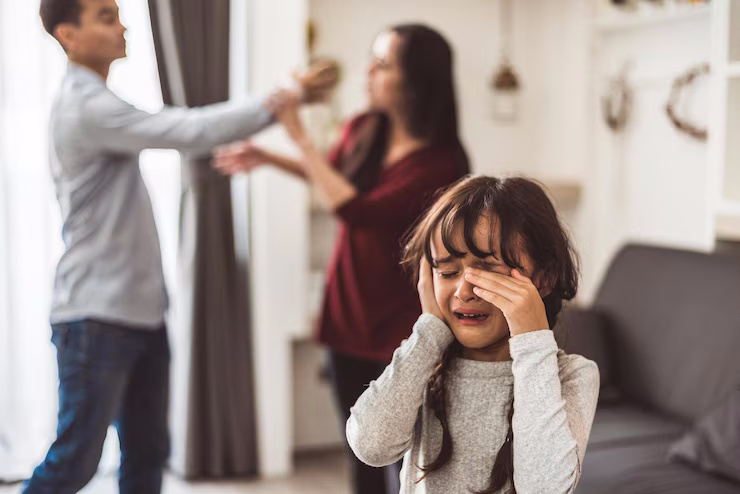The Impact of Parental Conflict on the Family

During my nearly 35 years as a family lawyer, a guardian ad litem, and now as a family mediator, I have worked with countless Virginia families struggling with parental conflict. I have come to have a profound understanding of the devastating impact that ongoing, unresolved parental conflict has on the children as well as the parents. I also have seen that by reducing the parental conflict and having child-focused discussions and negotiations, the damage to children and families is significantly mitigated and if parents implement child-centered approaches to negotiations early on, the negative impact to the children is largely preventable. Mediation helps parents chart a new course that focuses on the children’s best interests and is beneficial to the family now and in the years ahead.
Here are a few things to understand about conflict between parents and the impact on the family:
- Conflict takes on a life of its own often preventing parents from getting to the heart of the matter. Legal and substantive issues which must be resolved in order to move forward are caught up in the conflict and parents struggle to resolve these issues.
- Conflict often keeps parents stuck in a very negative place unable to fully heal and move forward, sometimes even years later.
- Conflict takes on a life of its own during litigation or adversarial negotiations. It becomes the fuel for ongoing conflict creating more acrimony, escalation of legal fees and costs, and rendering a healthy co-parenting relationship an uphill battle.
- Conflict in protracted litigation or adversarial negotiations frequently leave parents focused on a “winner versus loser” mentality leaving parents stuck in this negative place at a great financial and emotional cost.
- Conflict that continues over time, negatively impacts the parents’ co-parenting relationship and if it remains unresolved, has damaging consequences after divorce.
- Conflict in the co-parenting relationship, especially if it is ongoing after separation and divorce, has damaging consequences to the children in their childhood years and even into their adult years.
What Parents Can Do and How Mediation Helps:
- Parents can be intentional and choose to model constructive conflict resolution by using a process like family mediation. A good family mediator helps parents work to find compromises and reach fair agreements thereby eliminating the winner-loser mentality.
- By working in mediation to create their own child-centered agreements, parents are less likely to violate these agreements and they are less likely to litigate later. If a dispute arises in the future such as a modification to the parenting agreement, parents usually return to mediation to work it out.
- When parents reach an agreement using the mediation process, they are more likely to move forward with a more positive and healthier outlook rather than remaining stuck in a negative place. This promotes happier and healthier parents who can move forward in their lives. Mutually agreeing to use the mediation process to come to agreements is one of the first healthy steps to reducing conflict and resolving issues constructively.
- Resolving legal issues in mediation helps parents to avoid incurring costly attorney’s fees thereby lessening financial stress and preserving resources for the benefit of their children.
- Utilizing mental health and educational resources helps improve the co-parenting relationship and support the children’s emotional needs. Parents can work together in co-parenting therapy or by taking a co-parenting class. Parents and children may benefit from individual therapy as well. Find a support group. Many schools have divorce support groups for the children. Many churches also offer support groups for parents and/or children as well as ministry. In other words, don’t do this alone. Seek out appropriate support for the family.
- Help children to understand they have two parents who love them and two loving homes. Mediation is a great place for parents to discuss when, what, and how to talk with their children about the separation prior to telling the children. It is surprising how many parents tell the children about the separation without the other parent and without discussing it first with the other parent. Parents should be on the same page about what they will and will not tell the children. It is okay to tell children, there are some things that are between your mom and your dad that are “adult” issues which will not be shared, but that they will be kept in the loop (at an age appropriate level) on matters that impact them.
- Whenever possible, it is good to sit down together with the children when having conversations about the separation. Children need to understand what is changing and what is not changing in their lives- maybe their school, friend groups, and sports will stay the same, but they will now have two homes and will spend time separately with their parents. They also need to know that their parents love them enough to continue to work together as co-parents after the separation. Sitting down as a family to talk about the separation sends a strong and reassuring message to the children that their parents will work together and that they are still a family. Parents are encouraged to discuss all of this in mediation. It is one of the most important conversations parents will have with the children during the separation process.
- Along the vein of still being a family and feeling loved in both homes, it is very helpful to make sure both homes have reminders of the other parent such as a photo as well as making sure that there are familiar toys, belongings and knickknacks in both parents’ homes. Again, coming to an agreement in mediation about how to divide these items prevents a lot of unnecessary and avoidable conflict during the separation.
- If communication is strained between parents despite trying some of the suggestions above like co-parenting therapy or classes, etc.., parents may look at using a co-parenting app like Our Family Wizard or Talking Parents. Also, many parents find it helpful to use a shared calendar such as Google Calendar. Parents should research the apps and tools to determine what works best for the family’s needs.
- Children are ultimately the winners when parents resolve their legal matters in a child-focused and equitable manner. Mediation is an incredibly successful process to help parents reach agreements using a compassionate and child-centered approach.
- When parents are able to move forward and live joyful and healthy lives after divorce, their children will too.
If you are facing family conflict, consider divorce mediation. It’s a more cost-effective, less stressful, and more collaborative approach that can help you achieve a positive resolution for your family.
Call us today or schedule a free consultation and learn more about how our services can help you.

Lucy Nichols is a mediator at Colin Family Mediation Group and is an avid writer for The CFMG Blog.
